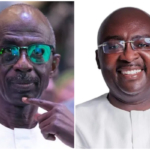
The Executive Director and Head of Research at Global InfoAnalytics, Mussa Dankwah, has highlighted a strategic preference among NDC voters for the NPP to select Dr. Mahamudu Bawumia as their flagbearer.
Conversely, he noted that NPP voters would prefer the NDC to elect Johnson Asiedu Nketiah, popularly known as General Mosquito, as their flagbearer.
Mr Dankwah’s statement on Joy Prime’s ‘Prime Insight’ in an interview with Blessed Sogah on Saturday, September 21, reveals a paradoxical dynamic in Ghanaian politics, where voters from the two major parties appear to prefer opposing candidates for their rivals.
This seemingly counterintuitive finding underscores a deep-seated strategic calculation among party loyalists.
For NDC voters, the preference for Dr. Bawumia as the NPP’s flagbearer may stem from a perception that his candidacy would be easier to defeat in a general election.
This view could be based on a number of factors, including the high cost of living and other economic challenges that characterised the previous NPP administration, in which he was Vice President and leader of the Economic Management Team.
Conversely, these voters might believe that a different, more popular NPP candidate would pose a greater threat to the NDC’s electoral prospects.
On the other side of the political divide, NPP voters’ preference for Asiedu Nketiah as the NDC’s flagbearer could be rooted in a belief that he is less formidable in a nationwide contest than other NDC frontrunners.
This could be due to his long service as the party’s General Secretary, a position that, while central to internal party organisation, is not seen as a traditional path to the presidency.
NPP voters might view him as a candidate who is less likely to garner broad appeal beyond the party’s base.
Mr Dankwah’s analysis suggests that the internal struggles for flagbearer positions within both the NDC and NPP are not just a matter of internal party politics but are also influenced by external perceptions and strategic preferences of rival voters.
For the NPP, the data suggests a potential vulnerability for Dr. Bawumia, and for the NDC, it highlights that some of their most prominent figures may be viewed as less of a threat by their primary opposition.
This dynamic of strategic voter preference adds a complex layer to the ongoing political campaigns and jostling for power within Ghana’s two largest political parties.
The insights from Global InfoAnalytics underscore that the next flagbearers for the NDC and NPP will not only be chosen by their party delegates but will also be judged on their perceived electability by the opposing side.